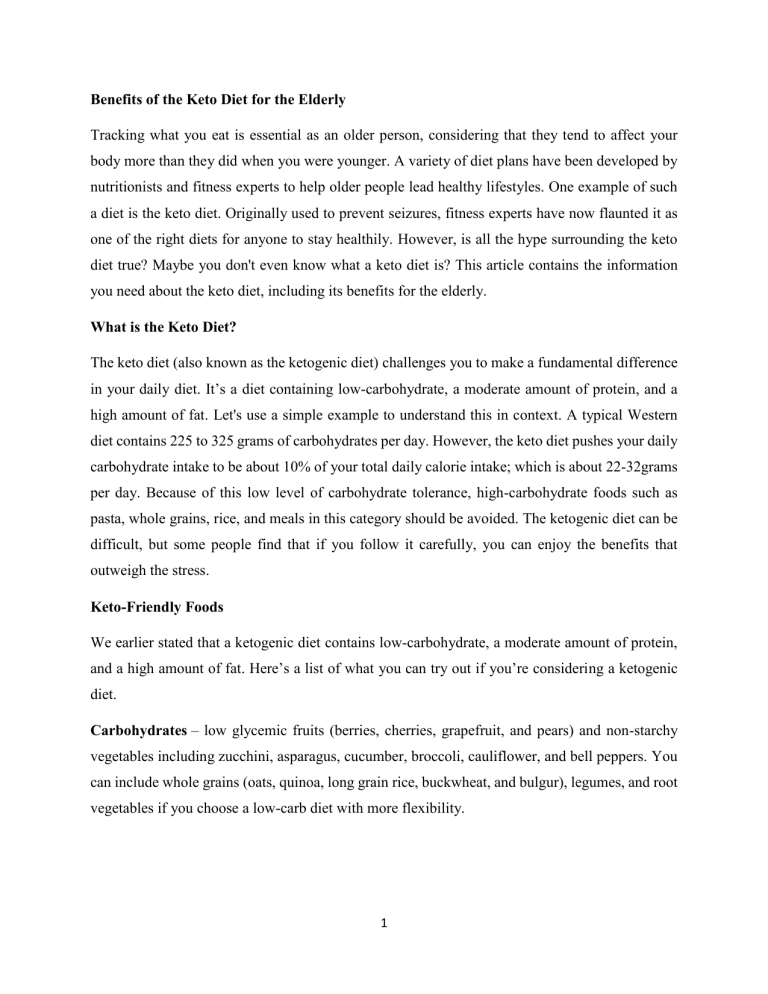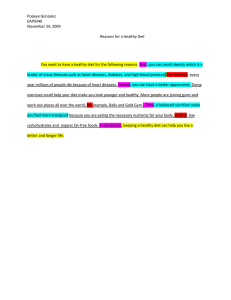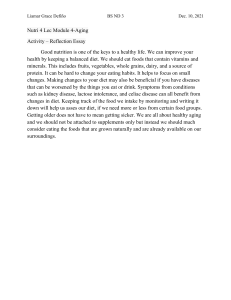
Benefits of the Keto Diet for the Elderly Tracking what you eat is essential as an older person, considering that they tend to affect your body more than they did when you were younger. A variety of diet plans have been developed by nutritionists and fitness experts to help older people lead healthy lifestyles. One example of such a diet is the keto diet. Originally used to prevent seizures, fitness experts have now flaunted it as one of the right diets for anyone to stay healthily. However, is all the hype surrounding the keto diet true? Maybe you don't even know what a keto diet is? This article contains the information you need about the keto diet, including its benefits for the elderly. What is the Keto Diet? The keto diet (also known as the ketogenic diet) challenges you to make a fundamental difference in your daily diet. It’s a diet containing low-carbohydrate, a moderate amount of protein, and a high amount of fat. Let's use a simple example to understand this in context. A typical Western diet contains 225 to 325 grams of carbohydrates per day. However, the keto diet pushes your daily carbohydrate intake to be about 10% of your total daily calorie intake; which is about 22-32grams per day. Because of this low level of carbohydrate tolerance, high-carbohydrate foods such as pasta, whole grains, rice, and meals in this category should be avoided. The ketogenic diet can be difficult, but some people find that if you follow it carefully, you can enjoy the benefits that outweigh the stress. Keto-Friendly Foods We earlier stated that a ketogenic diet contains low-carbohydrate, a moderate amount of protein, and a high amount of fat. Here’s a list of what you can try out if you’re considering a ketogenic diet. Carbohydrates – low glycemic fruits (berries, cherries, grapefruit, and pears) and non-starchy vegetables including zucchini, asparagus, cucumber, broccoli, cauliflower, and bell peppers. You can include whole grains (oats, quinoa, long grain rice, buckwheat, and bulgur), legumes, and root vegetables if you choose a low-carb diet with more flexibility. 1 Fats - Oils (like olive oil, avocado oil, and coconut oil), avocado, butter, ghee, fatty fish (salmon, mackerel, sardines), heavy cream, butter, cream cheese, cheese, and coconut (unsweetened), nuts (almonds, macadamia), and seeds (chia seeds, flaxseed, sunflower seeds), ground flax or chia seeds, and hemp seeds. Protein – lean cuts of meat (chicken, beef, pork, lamb), eggs, tofu, tempeh, protein powder, or collagen powder. Avoid processed meats as these not only contain harmful additives but also supply little nutrients compared to whole cuts of meat and can be tainted with hidden carbs. What are the benefits of the keto diet for the elderly? You might wonder if the ketogenic diet is worth the stress; considering how strict the diet is. Well, there are several reasons to try. 1. Helps you lose weight One of the most vital rules of the keto diet is that the food you eat should contain between 60-80% fat. Since most people say fat is bad, you might be wondering why this is the case. However, not all types of fat are bad. Trans fats are bad for you, while poly and monounsaturated fats are good for you. Therefore, it is the latter that should be included in the diet. Examples include whole-fat dairy products, cheese, and butter. Consuming this fat makes you feel full quickly, keeping your body's carbohydrate-to-fat ratio optimal. The latter is very helpful for weight loss. 2. Helps prevent inflammation. Inflammation is one of the main causes of long-term pain in the body. This can be due to a variety of reasons; diseases such as arthritis or conditions such as fatal bodily injuries. Inflammation is mediated by a specific substance produced by the body known as cytokines. However, with a keto diet, there`s a reduction in the production of cytokines, hence helping to prevent the amplification of pains in the body. 3. Helps to Improve Bone Health Osteoporosis, which makes bones fragile and brittle due to low bone density, is one of the most common illnesses in older men and women. One cause of this disease could be toxins present in the diet affecting the absorption of calcium. Getting more calcium from your daily dairy intake is not a solution. It is much better to focus on a ketogenic diet that is low in toxins, hence improving 2 calcium absorption. Although the diet may be strict and prevent you from eating some of your favorite foods, it is worth it in terms of the health benefits. If you're an older person who wants to try a healthy diet, it's a good idea to start a keto diet. 4. Provides you with adequate nutrients. Older people tend to be deficient in important nutrients such as - iron, whose deficiency can lead to brain fog and malaise, - Vitamin B12; the deficiency causes neurological disorders such as dementia, - Fat, whose deficiency can cause problems with perception, skin, and eyesight, Vitamin D; whose Deficiency causes cognitive impairment in the elderly, increases the risk of heart disease and even contributes to the risk of cancer. The high-quality animal protein sources found in ketogenic diets can easily provide an excellent source of these important nutrients. 5. Improves Cognitive Function Another important benefit of the ketogenic diet for the elderly is improved cognitive function. As we grow older, we all experience some loss of memory, reasoning, and other thinking skills. In more severe cases, it can lead to dementia and even Alzheimer's disease, which can be lifethreatening. To reduce the risk of Alzheimer's disease, it is advisable to make positive lifestyle changes, for example, quitting smoking, minimizing alcohol consumption, eating a healthy diet, and exercising regularly. Recent studies have shown that, in addition to the other activities mentioned, a ketogenic diet can significantly reduce the risk of developing Alzheimer's disease. This is because ketones provide a better fuel source for brain cells. Studies have shown that ketones provide long-term energy and increased neuronal growth and enhance neuronal cell signaling. 6. Blood Sugar Management Many older people suffer from insulin resistance, which is associated with or can lead to diabetes, which causes serious life-threatening complications. The ketogenic diet is especially recommended for those who want to control their blood sugar levels and reverse insulin resistance. This is primarily due to the ability to significantly reduce dietary sugar and restore blood sugar and insulin levels to normal. 3





